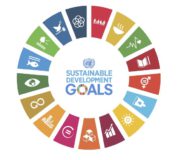The non-profit organization Verra — which developed and manages the world’s most widely used voluntary greenhouse gas (GHG) program, the Verified Carbon Standard (VCS) — launched the “Sustainable Development Verified Impact Standard”, or SD VISta for short. SD VISta sets out rules and criteria for the design, implementation, and assessment of projects that aim to deliver sustainable development benefits.
Each year, significant amounts of money are spent on sustainable development activities worldwide; in 2016, funding for official development assistance reached $143 billion. While donors and investors often require reports about their work from project developers, such outcome reporting is highly variable and rarely evaluated by an independent third party. As the sustainable development community looks to raise an additional $2.5 trillion for the purpose of achieving the Sustainable Development Goals (SDGs), the question of how this money can best drive real impact and transformation becomes ever more pressing.
Under SD VISta, projects must demonstrate to the satisfaction of a third-party assessor that they advance the SDGs. The SDGs were set by the United Nations with the intent to achieve sustainable development across three key dimensions – economic, social and environmental.SD VISta applies to any project that is contributing to the SDGs, including those related to eliminating hunger, promoting good human and environmental health and well-being, and ensuring education. A number of pilot projects are already demonstrating the potential of the standard.
“SD VISta will bring much-needed rigor to the assessment of sustainable development projects,” says David Antonioli, CEO of Verra. “Our past experience has shown that introducing a standard like SD VISta will add legitimacy, quality assurance, and transparency into the reporting of project outcomes and impact claims. Such robust assessments will benefit all parties involved — local communities, project teams, funders and investors — and help drive more finance towards high-performing projects that generate tangible benefits for people and the planet.”
How Does SD VISta Work?
All SD VISta projects must engage deeply with stakeholders, which ensures that communities’ needs and desires are taken into account and that they have opportunities to influence activities on the ground. SD VISta also establishes safeguards to guarantee that people, natural capital, and ecosystem services are not negatively impacted by the project’s activities. To apply the standard, projects must establish a “baseline” against which to compare progress, quantify the sustainable development benefits, and determine the netsustainable development impact of the project. These results are verified by an independent third-party assessor.
“SD VISta is an important addition to the standards offered by Verra,” says Julianne Baroody, who led the development of the new standard. “Many projects that are using the VCS and focus on reducing or removing greenhouse gas emissions have additional benefits. While the Climate, Community & Biodiversity (CCB) Standards, which are also managed by Verra, allow land-based projects to demonstrate their climate, community, and biodiversity benefits, SD VISta will allow other initiatives to report on other “beyond-carbon” benefits and link these directly to the SDGs.”
About Verra
Verra is a Washington, DC-based non-profit organization that manages standards for reducing GHG emissions, improving livelihoods and protecting natural resources. Its leading portfolio of standards includes the Verified Carbon Standard (VCS), the preeminent standard used by the voluntary carbon market with 1,400 registered projects in 80 countries, and the Climate, Community & Biodiversity (CCB) Standards with more than a hundred registered projects worldwide.
In addition, Verra manages the Jurisdictional and Nested REDD+ framework (JNR) and the Verra California Offset Project Registry (OPR), and is in the process of developing the Landscape Standard (with a number of partners) to promote and measure sustainability outcomes across agricultural and other productive landscapes. Finally, Verra is an implementing partner of the Initiative for Climate Action Transparency (ICAT), which helps countries assess the impacts of their climate actions and supports greater transparency, effectiveness, trust, and ambition in climate policies worldwide.




